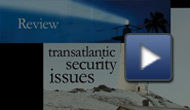-
Previous Editions
Last editions
Threats from within

Thoughts of a former extremist
Homegrown terrorism: how the EU sees it
What terror attacks tell us: the German example
The economic downturn: a boon for home-grown terrorists?
Terror, coercion and foreign policy
Homegrown terrorism in pictures
Homegrown failure: why the domestic terror threat is overblown
NATO Chicago Summit special edition

Chicago: right city, right time
Afghanistan snapshot: how the experts see it
Standing in line: what NATO means to me
From Cronkite to Korea: lessons learned
The US: at the heart of NATO since day 1
How well do you really know NATO?
Social media and NATO: it's complicated
NATO Summit 2012: what does it mean to Chicago
Václav Havel: remembering the big little man
-
Videos
Latest videos
(fact & figures video) Watch video
Homegrown terrorism: how the EU sees it Watch video
Homegrown terrorism: how can NATO fight it? Watch video
Making the concept a reality Watch video
-
About NATO Review
NATO Review: where the experts come to talk
NATO Review online magazine looks at key security issues through the eyes of the experts
How important does Madeleine Albright believe energy security is? Where does Paddy Ashdown believe the Balkans is heading? And how do award-winning journalists, economists and researchers see the future in diverse issues from organised crime to climate change?
- Newsletter

Unemployment, especially among the young, is rising across many countries. How will this affect homegrown terrorism patterns?
The economic downturn: a boon for home-grown terrorists?
The majority of studies conclude that socio-economic factors are poor indicators of terrorism. Yet factors such as poverty and education continue to be portrayed as fundamental drivers of terrorist violence in political rhetoric and practice targeted at preventing terrorism.
As we sit in the middle of an ongoing economic crisis, socio-economic issues have been forced into the limelight.
At first glance, the global financial crisis has certainly brought about distinctive conditions. These include:
- A widespread lack of economic growth,
- youth unemployment rates of over 50% in countries like Spain and Greece
- increasing levels of anti-austerity unrest across Europe, and
- rumours of contingency plans to restrict immigration in countries in the event of a financial collapse.
Does the current socio-economic landscape create the perfect storm for domestic, home-grown terrorist group recruitment? The resounding response to this question is ‘perhaps’.
Current thought is evolving in respect to this question. There is now a more nuanced discussion of the similarities and differences between domestic terror and international terror. There’s a move away from simply asking ‘if’ to asking ‘how’ socio-economic factors might influence participation in or support for terrorists groups.
evidence that directly contradicts the assumed link between poverty and terrorism can be found across multiple case studies of terrorists
Let us take poverty as an example. It has been flagged repeatedly as a potential primary driver of membership of terrorist organisations. Put simply, poverty - and unemployment - are often blamed for creating feelings of hopelessness and desperation. Poor economic conditions foster a lack of economic opportunities, resulting in a limited number of options for gainful employment. This generates a positive relationship between unemployment and individual levels of willingness to engage in terrorist violence, but this relationship is complicated.

Police respond to a botched homegrown terrorist attack on Glasgow airport in 2007. The two assailants were a medical doctor and a PhD student.
For example, while individuals from higher GDP countries are more likely to have a range of economic activities available to them and less likely to engage in terrorist activities, high levels of unemployment can increase the potential for terror organisations to recruit well-educated individuals capable of carrying out more effective, brutal attacks.
Conversely, economic growth has also been associated with increases in terrorism and support for terrorism. In this instance, economic growth has been shown to fuel political and social unrest as a result of the shockwaves of change that reverberate through a society. These changes cause higher degrees of social inequity. This fuels discontent and frustration, leaving the door open to terrorist groups who are keen to channel and offer solutions to the frustrations.
Furthermore, evidence that directly contradicts the assumed link between poverty and terrorism can be found across multiple case studies of terrorists.
- Bin Laden and the 9/11 hijackers came from comfortable backgrounds.
- Two-thirds of British terror suspects are reported to come from middle-class backgrounds.
- Hezbollah terrorists are allegedly educated to a higher degree than the pool from which they are drawn.
In summary, these mixed and, at times, contradictory findings, make it impossible to identify a straightforward association between poverty and terrorist group membership or support at this point in time.
‘Level of education’ has also been in the frame in popular discussions about the ability of terrorist groups to brainwash vulnerable, uneducated individuals. Nevertheless, a growing body of evidence suggests that individuals become politicised through education and that higher levels of education and socio-economic status can be associated with higher levels of support for (and participation in) terrorism. For example, individuals living far below the poverty line may be too distracted by issues of mere survival to consider engaging in terrorism, while educated individuals (especially unemployed, educated individuals) are more likely to have the time and necessary skills to engage with new ideas/solutions and to adapt and fit into a variety of environments needed for a successful attack. These skills make highly educated individuals attractive recruits to terrorist organisations.
Some researchers have argued that the repeated focus on international terrorism is irrational, as incidents of domestic terrorism are far more numerous than international terrorist incidents (less than 20% of reported attacks).
This is not an entirely new trend as evidence for this argument can be found in the case of the journalist, Ulriche Meinhof - of the Baader-Meinhoff gang. More recently, the perpetrator of the Fort Hood shooting in 2009 was a psychiatrist in the US Army, and Glasgow Airport was attacked by a medical doctor and a man with an engineering PhD 2007.
Clearly, higher levels of education, combined with poor economic opportunities have the potential to increase the appeal of terrorist organisations to disgruntled individuals. These findings go some way towards explain the lack of political will to fully reject support for the link between socio-economic factors and terrorism. As a result, the continued political focus on social issues in order to prevent terrorism appears to have some basis.
Observations drawn from this empirical evidence base deserve a cautionary note in relation to home-grown terrorism, as they are built primarily upon an understanding of international terrorism. Some researchers have argued that the repeated focus on international terrorism is irrational, as incidents of domestic terrorism are far more numerous than international terrorist incidents (less than 20% of reported attacks). In fact, some suggest that domestic terrorism incidents outnumber international terrorist incidents by eight to one. Others believe that countries with higher levels of economic development experience more terrorist attacks than those with lower economic development.
Debates and discussions in this area must refocus the analytical lens onto domestic terrorism and, thus, home-grown terrorism to truly understand the similarities and differences between these two types of terrorism. This refocus is likely to have lasting implications for national and international policy and practice, and may open the door to a new understanding of the relationship between socio-economic factors and home-grown terrorism.
How will the relationships between socio-economic issues such as poverty, level of education and terrorism manifest themselves in today’s recession-riddled world? While the evidence suggests that terrorists are not any more likely to come from an economically deprived or uneducated background, the potential of economic changes to fuel political and social unrest requires additional exploration. Will the shockwaves of austerity measures create new or additional social inequalities and fuel frustrations over poor expectations about future economic options? Will these dynamics improve the terrorist organisations’ ability to recruit highly educated individuals?
We are still unable to provide a definitive response to these questions but the evidence suggests that, whilst not creating a perfect storm, the current economic crisis has created a ‘weather front’ worthy of observation.
Dr. Brooke Rogers is a Senior Lecturer in Risk and Terror in the Department of War Studies, and a co-Director of the MA in Terrorism, Security and Society at King’s College London. Her current terrorism research focuses on responding to terrorism and violent radicalisation.
Dr. Brooke Rogers is a Senior Lecturer in Risk and Terror in the Department of War Studies, and a co-Director of the MA in Terrorism, Security and Society at King’s College London. Her current terrorism research focuses on responding to terrorism and violent radicalisation.



















